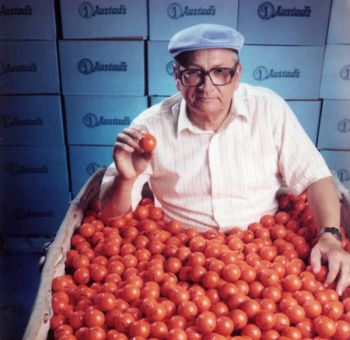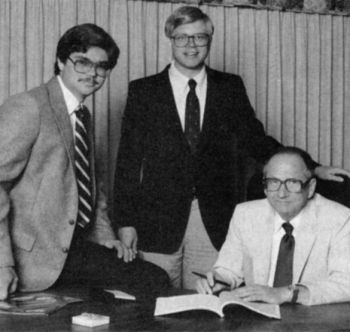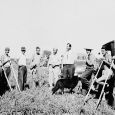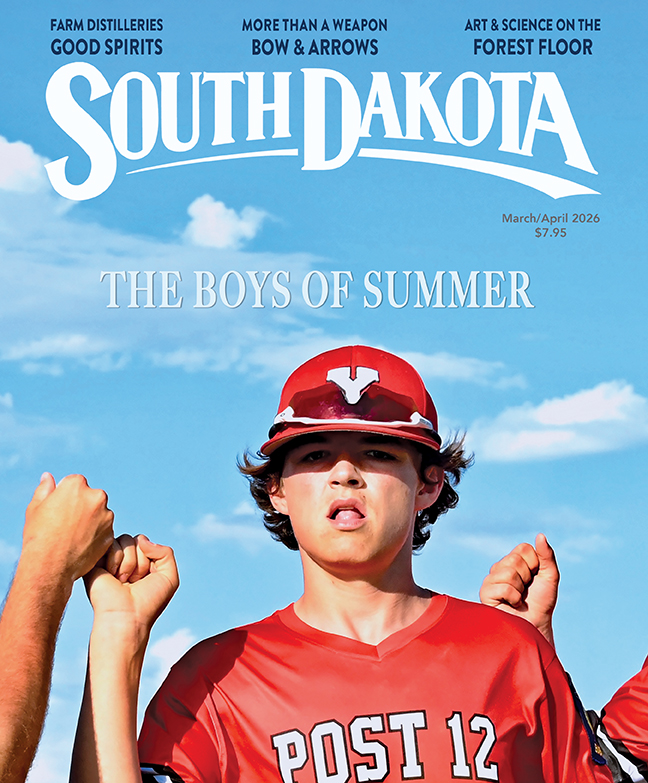The Gift of South Dakota
Subscriptions to South Dakota Magazine make great gifts!
Subscribe today — 1 year (6 issues) is just $29!
The Sales Secrets of Oscar Austad
Editor’s Note: Oscar Austad’s entrepreneurial spirit was unmatched, as evidenced by the golf empire he founded in Sioux Falls 1963. Austad’s Golf remains headquartered there, but has grown to include 10 locations in North Dakota, South Dakota, Nebraska, Minnesota and Iowa. We visited Austad in 1991, five years before his death, to find out how he became South Dakota’s mail-order millionaire.
Many Norwegians in South Dakota work too hard, shun alcohol and tobacco, shy away from golf courses, vote Republican and make lots of money. If they ever gather under one roof and form an association, it is likely to be called the Oscar Austad Society. Nobody exemplifies their values like the mail-order millionaire from Sioux Falls who started by selling cardboard golf club tubes from his car trunk.
Austad's early background seemed ideally suited for business mediocrity. His father wanted him to follow in his footsteps as a Fargo, North Dakota carpenter. Austad considered a law career but quit college after three years.
He was fired from the insurance business twice. (He had the unpopular habit of advising superiors on how to run their firms.) He disliked salesmanship, avoided social occasions where alcohol was served and couldn't resist telling prospects where to find the best deal, even if it wasn't from his company.
Just the kind of guy you want to do business with if you're buying golf equipment by mail, apparently, because 770,000 people placed orders with The Austad Company in 1990 and total sales exceeded $50 million.
The Sioux Falls firm has been the largest user of UPS ever since the brown trucks started rolling on South Dakota roads, and Oscar's WATTS line phone bill runs about $1 million annually. Telephones are manned 24 hours a day by a team of 160 people.
Austad once candidly told a newspaper reporter his weaknesses may have also been his strengths. "I had been a failure at a lot of things and I had five children to support (when he was fired again in 1963 as an insurance adjuster in Sioux Falls.) But I had no antagonism ... it merely spurred me on: Anytime I got fired or had a bad break, it became a good break because it made me buckle down like nothing else."
Austad's parents were Norwegian Lutheran immigrants. He learned how to work at an early age, earning 11 cents an hour as a bellhop at the local hotel and peddling newspapers on the street for a nickel.
He married Dorothy Hansberger and as the years passed, they found themselves with a houseful of kids (six, eventually). To earn extra cash, he sold golf equipment for his wife's brothers, who founded Ram Golf. His first product was a cardboard tube that golfers used to protect their clubs.
Initially he sold to retailers, but the idea of going directly to the consumer by mail intrigued him, so he got a list of Minnesota bankers and sent a postcard which advertised the tubes. "I thought bankers probably had the money to buy and the time to golf," he recalled. "To my pleasant surprise, they bought."
He added a few more products, mimeographed a flyer that his 12-person art department would laugh at today, and found another list. The phone company helped by providing free directories for every city in the United States. Gradually, he developed one of the hottest mailing lists in the sports world, with well over 2 million names of people who buy by mail.
"We experimented with 30 categories,” he said. “Bankers are probably the best. We also tried savings and loan executives, dentists, doctors, lawyers and stockbrokers. Doctors have the money, but they don't have the time so they haven't been that good. I would say stockbrokers and CPAs are among the poorest. I guess they're working too hard. We also tried insurance agents, funeral directors, teachers and ministers, with not such good results."
The Austads keep the list "clean" which means if you don't buy from them in two or three years, you get a letter asking if you want to continue to receive their mailings. They also collect data on the type of person on their list. The average catalog reader is male, middle-aged, earns $49,000 a year and, of course, plays golf.
Though business has mushroomed from year to year at Austad's, it has not grown without some crafty moves. Austad tried to expand into other types of sporting equipment but he eventually came to the conclusion his niche is with golfers. However, expansion has been continued by the development of Austad lines of golf clothing under the names Linksport and Sycamore Hills (the company headquarters is at Sycamore and 10th in Sioux Falls.)
"We have our own people who draw up the designs," he said. "We hire our own models and do the photo sessions in California and Hawaii and other resort locations."
A variety of golf-related products aside from clubs and balls have also increased sales. For example, linksters can order fur knit head covers for their clubs, a Caddy Plus electronic scorekeeper, a Sure Catch plastic gizmo which retrieves balls "from murky and deep water" and an $84.95 electronic Pro Golf game of the country's toughest holes. Personalized golf tees, monogrammed towels and a 24-karat gold plated putter are other products stocked and sold at Austads.
The products and price are important, Austad says, but the real trick to success by mail is service. Before employees can take orders for Austad’s, they must complete an extensive two-week training session that includes directions to service but not sell. "We don't hire a single salesman in the entire company," he says. In fact, even the clerks in the company's three retail stores are directed to simply greet customers and then allow them to browse without interruption. Service is stressed, not salesmanship.
"The key to mail order is to get the message across to people who want the product, and then have the right product at the right price and get it out to them quickly,” Austad says. “That impresses people."
Most orders are in the mail within 24 hours after arrival. Dissatisfied customers are a rarity. "We give faster attention to complaints than we do to new orders," he said. Buyers can receive a full refund even if they don't like the shade of pink. And it's not uncommon for the company to throw in a dozen golf balls to soothe a customer.
Austad seems to have been born with a knack for treating people like he would like to be treated, a nice sales trick that many big corporations wish they could emulate. But he doesn't consider himself a commercial genius, and he points to credit cards as proof. "I was kind of stupid along that line. I fought it for years and my son, who was then in junior high school, finally convinced me that we had to accept credit cards. He was right. No mail order company could stay in business today without them."
Unlike the characters in a lot of rags to riches stories, Austad says he never experienced a doubt in his mind or a serious crisis once the mail order business was under way. When he left his final insurance job in 1963, he figured his customers would buy enough golf balls to feed the kids. Today he employs two of those kids and 460 other people.
Dave is president of the company. Under his leadership, the mail order business has expanded internationally and two retail stores were recently opened at Minneapolis. A third store is located in Sioux Falls.
Randy, a former state senator from Minnehaha County and by many estimates a rising star for the state GOP, is executive vice president. Oscar served as a state senator during the Kneip administration in the early 1970s, and the Austad political tradition gave rise to a line of clubs and balls called Senator, which is gaining in popularity.
Politics has been but one of several of Oscar's causes. He has also been active with the National Right to Work Committee and the Center for National Labor Policy, which furnishes attorneys for workers who are being discriminated against because they refuse to join a union.
His employees have always been non-union, maybe because the boss is an advocate for more benefits. Austad's features profit-sharing, health coverage, protective glasses for computer operators, liberal leave policies for vacations and illnesses and such perks as free milk and orange juice during breaks.
But when the company asks workers to specify their favorite fringe benefit, they often write in one that is not even listed on the questionnaire: clean air.
Which leads to another Oscar Austad cause. He has never permitted smoking in his stores or offices — by customers or employees. "In our 28 years of business, we have not allowed anyone to smoke in our building. People once thought I was crazy, but now they're coming around to our way of thinking," he said.
For the past five years, it has been company policy to not hire anyone who smokes. "Somebody is probably going to take me to court for discrimination on that one," he said with a determined grin. "Let them. I'll enjoy every minute of it."
His no smoking rule knows no exceptions. "We even kicked two governors out of here (Richard Kneip and Bill Janklow) for lighting up. They took it very well."
For many years, Austad served as board member and chairman of a national group called Action on Smoking and Health. He has also been a local advocate for the rights of non-smokers and has spoken at many business and health conferences on the subject. "It irritated me every time I was sitting next to a smoker, breathing impure air."
Austad also isn't a fan of alcoholic beverages. According to one story, as a 9-year-old he promised his mother he would never drink or smoke, and when he found that their church was using wine at communion, he tried to convince the minister to substitute grape juice. Although The Austad Company has hosted employees at numerous social functions, alcohol has never been served.
Although Austad says South Dakota has been a good place to build a business — primarily because of the honest and hardworking labor force — he is glad he doesn't have to rely on his home state for income. Only about 2 percent of the company's mail order sales are from South Dakotans. The rest come from the remaining 49 states and from 53 foreign countries. Business from Japan and Sweden has grown so much that the Austads now publish catalogs in Japanese and Swedish.
Austad also investigated the potential of publishing a catalog for his parents' homeland, Norway, but he discovered there aren't many Norwegian golfers. It might be in the blood. He never golfed until he started selling golf equipment, and he jokes that he quit a few years later "because I was such a poor advertisement for our equipment!"
Today, he says, his sons handle the responsibilities on the golf course, as well as most of the other duties at the company. "They have been doing a great job, a tremendous job. I know they are because every few weeks, some big outfit contacts us and wants to buy us out."
There's no chance of a sale. Dave is 30 and Randy just 34. "And we're all having fun in this business," he said.
That includes the employees. There is remarkably little turnover at the firm. Austad's first employee, Sharon Stahl, whom he describes as "a farm girl from Yale," is still on the payroll. In fact, she is now corporate treasurer and a member of the board of directors.
He and Sharon recall those early days when they both answered the phone, opened the mail and greeted customers in a dumpy Eighth Street warehouse in the industrial section of Sioux Falls. In those days, he was discouraged from answering the phone because if he didn't have exactly what the caller wanted he was quick to recommend a competitor. "I never was much of a salesman," he claims modestly.
He can say it. But he isn't fooling many people today. The quiet Norwegian from Fargo might be one of the smoothest salesmen of our times.
Editor’s Note: This story is revised from the March/April 1991 issue of South Dakota Magazine. To order a copy or to subscribe, call (800) 456-5117.












Comments